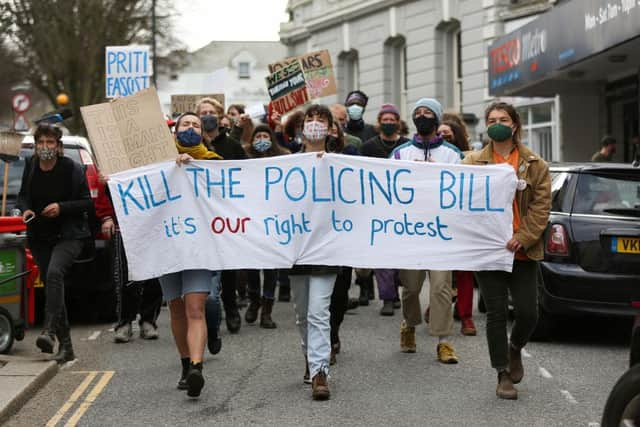Kill the Bill: why protestors are planning a 'weekend of action' against policing bill - and what police have said
and live on Freeview channel 276
Police forces across England have issued warnings against people gathering over the Easter weekend as multiple Kill the Bill protests are expected to take place on Friday.
The rallies are planned in response to the Government’s proposed Police, Crime, Sentencing and Courts Bill with events planned in Leeds, London, Manchester and Southampton.
Advertisement
Hide AdAdvertisement
Hide AdProtests are lawful providing organisers submit a risk assessment and take steps to ensure the gatherings are safe, but the Metropolitan Police warned on Thursday the safety of the wider community is paramount.


The force said: “Enforcement action will be taken, if needed, in the interests of public health.”
Meanwhile, Greater Manchester Police sought to avoid a repeat of scenes played out across the country this week by introducing a 48-hour dispersal order for the city centre, to last until 3pm on Saturday.
It means officers can direct anyone acting anti-socially to leave the area.
What happened at the first Kill The Bill protests?
Advertisement
Hide AdAdvertisement
Hide AdOn March 21 what began as a non-violent protest against the Police, Crime, Sentencing and Courts Bill turned violent as hundreds of protesters gathered at the New Bridewell police station in Bristol after marching from College Green.
The windows of the police station were smashed, and Avon and Somerset Police vans parked nearby were also targeted.
Police said that missiles had been thrown at them, including a firework.
Pictures of the protest showed mounted officers attempting to intervene and disperse the crowd that had gathered. Other pictures showed graffiti being sprayed on police vehicles.
Advertisement
Hide AdAdvertisement
Hide AdProtestors also set fire to a police van parked on Bridewell Street, near the police station.
The force claimed that one officer suffered from a broken arm, and another from broken ribs, though this was later debunked
Avon and Somerset Police had encouraged people to stay away from the demonstration and attend virtual protests instead. Under current Covid-19 regulations, mass gatherings are banned and anyone breaching these restrictions could be fined.
What is the Police, Crime, Sentencing and Courts Bill?
The Police, Crime, Sentencing and Courts Bill has proved extremely controversial, with protests against it taking place around the country.
Advertisement
Hide AdAdvertisement
Hide AdUnder current laws, police are only able to place restrictions on protests if there is a threat of “serious public disorder, serious damage to property or serious disruption to life in the community”.
However, under the new policing bill, police chiefs would be able to set noise limits and impose a start and finish time on protests - these rules would also be applicable to a protest of a single person.
Those who fail to act in accordance with police rules could be issued a £2,500 fine, and police will be able to issue punishments to those who “ought” to have known about restrictions, rather than needing to prove that protesters knew.
The bill would also introduce the crime of “intentionally or recklessly causing public nuisance” with the intention of preventing protest tactics of occupying public spaces.
Advertisement
Hide AdAdvertisement
Hide AdFollowing the summer Black Lives Matter protests which saw protesters topple the statue of slave owner Edward Colson, the new maximum punishment for damage to memorials would be increased to a ten year prison sentence.
The bill also proposes a number of other measures, such as introducing life sentenced for killer drivers and allowing profoundly deaf people to sit on juries for the first time by allowing a British sign language interpreter into the jury deliberation room.